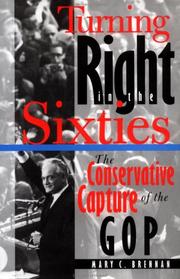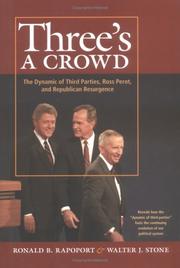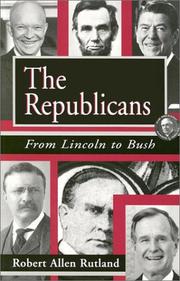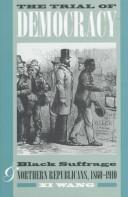Book
ISBN: 0190079398 0190079371 019007938X 9780190079369 0190079363 Year: 2019 Publisher: New York, NY : Oxford University Press,
Abstract | Keywords | Export | Availability | Bookmark
 Loading...
Loading...Choose an application
- Reference Manager
- EndNote
- RefWorks (Direct export to RefWorks)
'Age of Iron' attempts to describe the past, present, and possible future of conservative nationalism in American foreign policy. It argues that a kind of conservative US nationalism long predates the Trump presidency, and goes back to the American founding.
Nationalism --- History. --- Republican Party (U.S. : 1854- ) --- United States --- Foreign relations. --- Politics and government. --- GOP (Republican Party (U.S. : 1854- )) --- Grand Old Party --- National Union Party (U.S. : 1854- ) --- National Union Republican Party (U.S. : 1854- ) --- Republican Party --- Republicans (Political party : U.S. : 1854- ) --- Respublikanskai︠a︡ partii︠a︡ SShA (U.S. : 1854- ) --- Union Party (U.S. : 1854- ) --- Union Republican Party (U.S. : 1854- ) --- Government --- History, Political --- Conservatism - United States --- Nationalism - United States --- Populism - United States --- United States - Foreign relations - Philosophy --- Conservatism --- Populism
Book
ISBN: 0190630566 Year: 2016 Publisher: New York, NY : Oxford University Press,
Abstract | Keywords | Export | Availability | Bookmark
 Loading...
Loading...Choose an application
- Reference Manager
- EndNote
- RefWorks (Direct export to RefWorks)
The Democratic Party is a coalition of social groups that act as discrete voting blocs for candidates, constituencies for group leaders, and demanders of particular policy commitments. Since the 1960s, the evolution in the relative internal influence of Democratic Party constituencies has reduced the size of the party's conservative wing and expanded its policy agenda - but no organized liberal movement has emerged to dominate its internal organization or succeed in shifting its policies toward leftist positions. The Republican Party, in contrast, serves as the vehicle of a conservative ideological movement that has succeeded in fusing its intellectual strands, marketing its broad critiques of government, building a supportive organizational network, and moving the party toward the policy commitments of its right wing.
Party affiliation --- Political culture --- Republican Party (U.S. : 1854- ) --- Democratic Party (U.S.) --- Demokratische Partei (U.S.) --- Partai Demokrat (U.S.) --- Republican Party (U.S. : 1792-1828) --- GOP (Republican Party (U.S. : 1854- )) --- Grand Old Party --- National Union Party (U.S. : 1854- ) --- National Union Republican Party (U.S. : 1854- ) --- Republican Party --- Republicans (Political party : U.S. : 1854- ) --- Respublikanskai︠a︡ partii︠a︡ SShA (U.S. : 1854- ) --- Union Party (U.S. : 1854- ) --- Union Republican Party (U.S. : 1854- )
Book
ISBN: 9781107007048 9780511843907 9781107666146 9781139128377 113912837X 0511843909 1283383829 9781283383820 9781139117715 1139117718 9781139115544 1139115545 1107007046 1107221684 9781107221680 1139124935 9781139124935 9786613383822 6613383821 1139123467 9781139123464 1139113356 9781139113359 1107666147 Year: 2012 Publisher: Cambridge New York Cambridge University Press
Abstract | Keywords | Export | Availability | Bookmark
 Loading...
Loading...Choose an application
- Reference Manager
- EndNote
- RefWorks (Direct export to RefWorks)
During a long period of the twentieth century, stretching from the Great Depression until the Reagan years, defeat generally characterized the electoral record of the Republican party. Although Republicans sometimes secured victory in presidential contests, a majority of Americans identified with the Democratic party, not the GOP. This book investigates how Republicans tackled the problem of their party's minority status and why their efforts to boost GOP fortunes usually ended in failure. At the heart of the Republicans' minority puzzle was the profound and persistent popularity of New Deal liberalism. This puzzle was stubbornly resistant to solution. Efforts to develop a Republican version of government activism met little success. Only the Democratic party's decline eventually created opportunities for Republican resurgence. This book is the first to offer a wide-ranging analysis of the topic, which is of central importance to any understanding of modern US political history.
Republican Party (U.S.:1854- ) --- History --- 20th century --- United States --- Politics and government --- Republican Party (U.S. : 1854- ) --- GOP (Republican Party (U.S. : 1854- )) --- Grand Old Party --- National Union Party (U.S. : 1854- ) --- National Union Republican Party (U.S. : 1854- ) --- Republican Party --- Republicans (Political party : U.S. : 1854- ) --- Respublikanskai︠a︡ partii︠a︡ SShA (U.S. : 1854- ) --- Union Party (U.S. : 1854- ) --- Union Republican Party (U.S. : 1854- ) --- Arts and Humanities

ISBN: 0807822302 0585003785 9780585003788 9780807822302 0807860565 9780807860564 9798890874962 Year: 1995 Publisher: Chapel Hill University of North Carolina Press
Abstract | Keywords | Export | Availability | Bookmark
 Loading...
Loading...Choose an application
- Reference Manager
- EndNote
- RefWorks (Direct export to RefWorks)
Ideologically divided and disorganized in 1960, the conservative wing of the Republican Party appeared to many to be virtually obsolete. However, over the course of that decade, the Right reinvented itself and gained control of the party. In Turning Right in the Sixties, Mary Brennan describes how conservative Americans from a variety of backgrounds, feeling disfranchised and ignored, joined forces to make their voices heard and by 1968 had gained enough power within the party to play the decisive role in determining the presidential nominee. Building on Barry Goldwater's short-lived bid for the presidential nomination in 1960, Republican conservatives forged new coalitions, began to organize at the grassroots level, and gained enough support to guarantee Goldwater the nomination in 1964. Brennan argues that Goldwater's loss to Lyndon Johnson in the general election has obscured the more significant fact that conservatives had wrested control of the Republican Party from the moderates who had dominated it for years. The lessons conservatives learned in that campaign, she says, aided them in 1968 and laid the groundwork for Ronald Reagan's presidential victory in 1980.
Conservatism --- United States --- Republican Party (U.S.:1854- ) --- Politics and government --- 1945-1989 --- Republican Party (U.S. : 1854- ) --- GOP (Republican Party (U.S. : 1854- )) --- Grand Old Party --- National Union Party (U.S. : 1854- ) --- National Union Republican Party (U.S. : 1854- ) --- Republican Party --- Republicans (Political party : U.S. : 1854- ) --- Respublikanskai︠a︡ partii︠a︡ SShA (U.S. : 1854- ) --- Union Party (U.S. : 1854- ) --- Union Republican Party (U.S. : 1854- )
Book
ISBN: 9786611793753 1281793752 0875866050 9780875866055 9780875866031 0875866034 9780875866048 0875866042 9781281793751 0875866034 0875866042 6611793755 Year: 2008 Publisher: New York Algora Pub.
Abstract | Keywords | Export | Availability | Bookmark
 Loading...
Loading...Choose an application
- Reference Manager
- EndNote
- RefWorks (Direct export to RefWorks)
Who are the real voters? Drawing on authoritative nationwide surveys and a wide range of quips and quotes, the author outlines the profiles of the average Republican and Democrat, and details their lifestyles, ethics, intelligence, and achievements in a multitude of charts and statistics. A recognized whistleblower who identified 2BN in false Social Security claims, the author pokes fun while poking holes in our prejudices about both national parties. This work, he says, is "an informative, fair, and constructive book that can broaden your understanding of Democrats and Republicans. Also, it'
Party affiliation --- Democratic Party (U.S.) --- Republican Party (U.S. : 1854- ) --- GOP (Republican Party (U.S. : 1854- )) --- Grand Old Party --- National Union Party (U.S. : 1854- ) --- National Union Republican Party (U.S. : 1854- ) --- Republican Party --- Republicans (Political party : U.S. : 1854- ) --- Respublikanskai︠a︡ partii︠a︡ SShA (U.S. : 1854- ) --- Union Party (U.S. : 1854- ) --- Union Republican Party (U.S. : 1854- ) --- Republican Party (U.S. : 1792-1828) --- Demokratische Partei (U.S.) --- Partai Demokrat (U.S.) --- Geschichte 1977-2006
Book
ISBN: 1282721984 9786612721984 1400836751 9781400836758 9780691141817 0691141819 9780691141824 0691141827 9781282721982 Year: 2010 Publisher: Princeton, NJ
Abstract | Keywords | Export | Availability | Bookmark
 Loading...
Loading...Choose an application
- Reference Manager
- EndNote
- RefWorks (Direct export to RefWorks)
Hard Line traces the history of Republican Party foreign policy since World War II by focusing on the conservative leaders who shaped it. Colin Dueck closely examines the political careers and foreign-policy legacies of Robert Taft, Dwight Eisenhower, Barry Goldwater, Richard Nixon, Henry Kissinger, Ronald Reagan, George H. W. Bush, and George W. Bush. He shows how Republicans shifted away from isolationism in the years leading up to World War II and oscillated between realism and idealism during and after the cold war. Yet despite these changes, Dueck argues, conservative foreign policy has been characterized by a hawkish and intense American nationalism, and presidential leadership has been the driving force behind it. What does the future hold for Republican foreign policy? Hard Line demonstrates that the answer depends on who becomes the next Republican president. Dueck challenges the popular notion that Republican foreign policy today is beholden to economic interests or neoconservative intellectuals. He shows how Republican presidents have been granted remarkably wide leeway to define their party's foreign policy in the past, and how the future of conservative foreign policy will depend on whether the next Republican president exercises the prudence, pragmatism, and care needed to implement hawkish foreign policies skillfully and successfully. Hard Line reveals how most Republican presidents since World War II have done just that, and how their accomplishments can help guide future conservative presidents.
Nationalism --- Conservatism --- Presidents --- Presidency --- Heads of state --- Executive power --- History --- Republican Party (U.S. : 1854-) --- GOP (Republican Party (U.S. : 1854- )) --- Grand Old Party --- National Union Party (U.S. : 1854- ) --- National Union Republican Party (U.S. : 1854- ) --- Republican Party --- Republicans (Political party : U.S. : 1854- ) --- Respublikanskai︠a︡ partii︠a︡ SShA (U.S. : 1854- ) --- Union Party (U.S. : 1854- ) --- Union Republican Party (U.S. : 1854- ) --- United States --- Foreign relations administration. --- Foreign relations --- Philosophy. --- Republican Party (U.S. : 1854- )

ISBN: 1283044439 9786613044433 0472026151 9780472026159 0472114530 9780472114535 9781283044431 6613044431 9780472030996 047203099X Year: 2008 Publisher: Ann Arbor
Abstract | Keywords | Export | Availability | Bookmark
 Loading...
Loading...Choose an application
- Reference Manager
- EndNote
- RefWorks (Direct export to RefWorks)
Political parties --- Perot, Ross, --- Perot, H. Ross --- Perot, Henry Ross, --- Perot, Henry Ray, --- Republican Party (U.S. : 1854- ) --- GOP (Republican Party (U.S. : 1854- )) --- Grand Old Party --- National Union Party (U.S. : 1854- ) --- National Union Republican Party (U.S. : 1854- ) --- Republican Party --- Republicans (Political party : U.S. : 1854- ) --- Respublikanskai︠a︡ partii︠a︡ SShA (U.S. : 1854- ) --- Union Party (U.S. : 1854- ) --- Union Republican Party (U.S. : 1854- ) --- Perot, H. Ross,
Book
ISBN: 0813043999 0813040612 9780813040615 9780813036847 0813036844 9780813043999 Year: 2011 Publisher: Gainesville University Press of Florida
Abstract | Keywords | Export | Availability | Bookmark
 Loading...
Loading...Choose an application
- Reference Manager
- EndNote
- RefWorks (Direct export to RefWorks)
Has the South, once the ""Solid South"" of the Democratic Party, truly become an unassailable Republican stronghold? If so, when, where, why, and how did this seismic change occur? Moreover, what are the implications for the U.S. body politic?. Painting Dixie Red is the first volume to grapple with these difficult yet critical questions. In this fascinating and timely collection, a distinguished group of scholars engages in an enlightening debate. Some make the case that the South has become Republican, and some contend that it has not. Some outline the region's exceptionalism, and some reject
Republican Party (U.S. : 1854- ) --- GOP (Republican Party (U.S. : 1854- )) --- Grand Old Party --- National Union Party (U.S. : 1854- ) --- National Union Republican Party (U.S. : 1854- ) --- Republican Party --- Republicans (Political party : U.S. : 1854- ) --- Respublikanskai︠a︡ partii︠a︡ SShA (U.S. : 1854- ) --- Union Party (U.S. : 1854- ) --- Union Republican Party (U.S. : 1854- ) --- History --- Southern States --- Politics and government --- 1951 --- -Republican Party (U.S.:1854- ) --- 20th century

ISBN: 0826261566 9780826261564 0826210902 9780826210906 Year: 1996 Publisher: Columbia ; London University of Missouri Press
Abstract | Keywords | Export | Availability | Bookmark
 Loading...
Loading...Choose an application
- Reference Manager
- EndNote
- RefWorks (Direct export to RefWorks)
The Republican party has always been fascinating to those who subscribe to its principles, as well as to those who take an alternative stand on the issues. In The Republicans: From Lincoln to Bush, Robert Allen Rutland has brought a clear and concise understanding of this political party to the general reader. The book is a lucid and fast-paced overview of the Republican party from its beginnings in the 1850s through the 1994 congressional elections, which saw the. Democratic domination of the House and Senate come to an abrupt end. In a crisp, highly readable style, Rutland begins by explaining how the "obnoxious" Kansas-Nebraska Act of 1854 overturned the Missouri Compromise, inflamed the North, and caused the collapse of the Whig and American parties. The result was the birth of the Republican party, whose purpose was to oppose the Democrats and stop the spread of slavery. Abraham Lincoln was elected the first Republican. President in 1860.
Government - U.S. --- Law, Politics & Government --- Political Rights - U.S. --- Republican Party (U.S. : 1854- ) --- GOP (Republican Party (U.S. : 1854- )) --- Grand Old Party --- National Union Party (U.S. : 1854- ) --- National Union Republican Party (U.S. : 1854- ) --- Republican Party --- Republicans (Political party : U.S. : 1854- ) --- Respublikanskai︠a︡ partii︠a︡ SShA (U.S. : 1854- ) --- Union Party (U.S. : 1854- ) --- Union Republican Party (U.S. : 1854- ) --- History. --- Republican Party (U.S.:1854- ) --- History

ISBN: 1283612879 9786613925329 0820342068 9780820342061 082031837X 9780820318370 9781283612876 6613925322 Year: 1997 Publisher: Athens University of Georgia Press
Abstract | Keywords | Export | Availability | Bookmark
 Loading...
Loading...Choose an application
- Reference Manager
- EndNote
- RefWorks (Direct export to RefWorks)
Following the Civil War, Republicans teamed with activist African Americans to protect Black voting rights through constitutional reform. This work looks at the forces and mechanisms which led to Black suffrage, and follows the issues into the early 20th century.
African Americans --- Afro-Americans --- Black Americans --- Colored people (United States) --- Negroes --- Africans --- Ethnology --- Blacks --- Suffrage --- History. --- Republican Party (U.S. : 1854- ) --- GOP (Republican Party (U.S. : 1854- )) --- Grand Old Party --- National Union Party (U.S. : 1854- ) --- National Union Republican Party (U.S. : 1854- ) --- Republican Party --- Republicans (Political party : U.S. : 1854- ) --- Respublikanskai︠a︡ partii︠a︡ SShA (U.S. : 1854- ) --- Union Party (U.S. : 1854- ) --- Union Republican Party (U.S. : 1854- ) --- United States --- Politics and government --- Black people

 Search
Search Feedback
Feedback About UniCat
About UniCat  Help
Help News
News